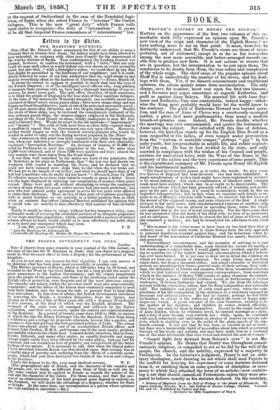THE PROPER GOVERNMENT FOR DUDE.
London.
Sin—I observe from some remarks in your journal of the 13th instant, on the tour of the late Sir W. Sleeman in Oude, that you object to a proposal made by that deceased officer to form a Regency for the government of that kingdom.
As you do not state any reasons for this objection, I can only answer it by showing what has been done moat successfully in another case. The Hindoo province of Kutch, which is 160 miles long by 50 broad, and bounded to the West by the river Indus, was for a long period the source of great annoyance to the Indian Government; and the crimes perpetrated upon the people of the province, and those of the bordering states under the British rule or protection, were frequent and of the most atrocious nature. The anarchy and misery within the province itself were also unaccountably lamentable ; and the ladies of the harem were constantly compelled to land their little trinkets into the bazaar for sale, to procure food to keep them from starvation. In this state of affairs, the British Government interfered by removing the Rajah, a drunken debauchee, from the throne, and placing on it his son, a boy of three years old, with a Regency (Punchayet) of five persona, at the head of which was the English Resident. The revenues of the state were all managed and collected by the Native authorities, and their own servants, under the control and superintendence of the Resident. In a period of twenty years from 1820 to 1840, in sixteen of which the late Sir Henry Pottinger was the Resident, Kutch from being a wilderness and a refuge for desperate criminals, became like a garden, and remains to this date perhaps the best-governed portion of India. The young
Prince was placed under the care of accomplished British officer, now Colonel John Crofton, H.M.S., and became one of the most manly, prudent, and amiable rulers in the whole East. I cannot doubt, therefore, that in 0 ude, Scinde, Sittarah, and many other states, an equally desirable and happy change might easily have been effected by the same policy, had our lust for conquest, and our scandalous love of plunder, not overpowered all the better
feelings of our nature. It is ne ry to add, that when the liberal policy I have described towards Kutch was first decided upon, that country was in a fearful state of poverty and suffering from the effects of a terrible earth- quake, which had just then destroyed two-thirds of the towns and villages in the province.
I have the honour to be, Sir, your most obedient servant, W. P. [The geographical site of Kutch, and the character of the country and the people, are, we think, as different from those of Oude as well can be. The same remark may be applied to Seinde as regards the nature of the rule and the character of the rulers. For these reasons, and that the sue- MA of an administration of the kind proposed must depend so entirely on the Resident, we still doubt the advantage of a Regency, whether for Oude or Scinde. At the same time, our correspondent is a person whose opinions are well entitled to attention.—En.)


























 Previous page
Previous page